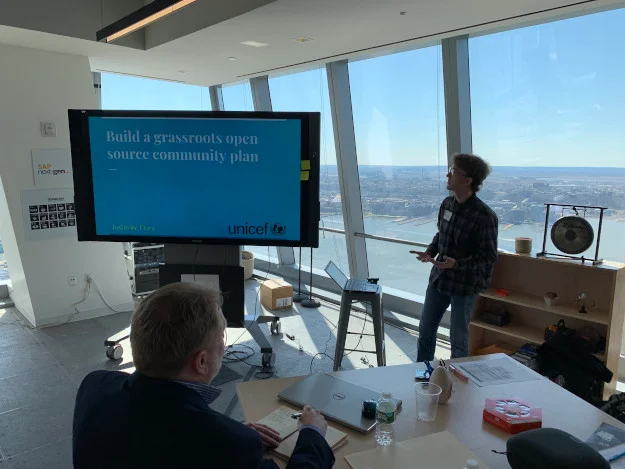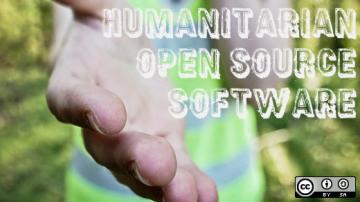Free and open source software are no longer workplace taboos, at least not in the same way they were fifteen years ago. Today, distributed collaboration platforms and tools empower people around the world to contribute code, documentation, design, leadership, and other skills to open source projects. But do newcomers actually have a deep understanding of free and open source software?
If you hang around in open source communities for long enough, you realize there is more to open source than slapping a free software license on a project and throwing it over an imaginary fence to wait for contributors who never come. To address this problem in the humanitarian sector, the LibreCorps program, led by Rochester Institute of Technology's FOSS initiative at the Center for Media, Arts, Interaction & Creativity (MAGIC,) partnered with UNICEF to develop a set of resources to help new open source maintainers chart an "open source roadmap" to build a community.

What is LibreCorps?
LibreCorps connects RIT students interested in open source to humanitarian and civic coding opportunities; specifically, opportunities for co-operative education placements (co-ops,) which are full-time paid internships included in the university's graduation requirements.
LibreCorps students work in two major areas on co-ops. The first, not surprisingly, is technology. The second is FOSS community and processes. Many NGOs and civic organizations put openly licensed work in repositories but need a plan to build and maintain a community of contributors around their technology.
LibreCorps has worked with numerous humanitarian projects over the years. Recently, LibreCorps was contracted by UNICEF Innovation to support the Innovation Fund by mentoring several cohorts of international start-ups in adopting best practices to meet the open source requirement of their funding.
Periodically, the UNICEF Innovation Fund invites the companies together for cohort workshops, with hands-on mentorship a primary component of the workshop. Stephen Jacobs and Justin W. Flory represented LibreCorps at two UNICEF Innovation Fund workshops to help these teams better understand free and open source, as well as how to successfully build communities and teams that operate as open organizations. Most of these teams have either never worked in open source projects or only have a basic understanding of licenses and GitHub. Often, for these teams, working on your code in a way where anyone can see what you are doing is a radical shift in process.
UNICEF Innovation has engaged with open source for years and currently provides funded teams with a course on open source business models.
"We'd approached open-source pretty tentatively and definitely naively. We were keen to move to open source for transparency and perception but, beyond that, had no plans around deriving or creating value, and we were nervous about the perceived risks. The mentorship from Mike Nolan has given us clear direction and a deeper understanding that open source isn't a compromise but a communication channel and a way to build a community, and he's giving us the tools that enable that." — Michael Nunan, Director at Tupaia.
How do we create workable community strategy guides?
This past summer, LibreCorps began developing and evolving resources to help these teams take the complex and difficult challenge of building an open source community and break it down into smaller, more manageable steps. Mike Nolan and Kent Reese developed a roadmap template for teams to evaluate their current status in maintainership best practices and chart out milestones for where to go next. For a cohort working in open source for the first time, the LibreCorps team offers advice and suggestions on crafting a mission statement, choosing the right license for your project, and more. The rubrics provide an interactive, color-coded reference to unlock a deeper understanding of their progress towards each milestone.
Let's explore each resource in more detail to understand how they work:
Roadmap template
The roadmap template is a resource that gets hands-on and personal to a specific open source project. There are five tracks within the roadmaps with different tasks to gradually ramp up the areas of focus for community management.
The first track includes milestones like writing a mission statement, choosing a free software license, and establishing a code of conduct, and provides a set of open source tools or frameworks for users to learn more about. The second track includes gradually more advanced milestones like documenting how to set up a development environment, learning the pull request workflow, choosing a project hosting platform, and more. Further tracks include milestones like implementing continuous integration (CI,) organizing community events, and gathering user testimonials.
The LibreCorps team works with each Innovation Fund team within the cohort to create a rubric specific to their projects. The cohort identifies their current position based on which milestone they are currently working toward. Then, we work together to determine next steps for growing their open source community, then create a strategy to reach and accomplish those goals.
Self-evaluation rubric
The milestone template provides high-level guidance on which direction to go, but the self-evaluation rubric is a feedback mechanism to give cohorts a picture of exceptional, acceptable, and poor implementations for each assigned task. The self-evaluation rubrics enable LibreCorps cohorts to independently self-evaluate progress towards building a sustainable and open community.
The rubric is organized into five tracks:
- Community outreach
- Continuous integration and health checks
- Documentation
- Project management
- Workflow
Each track includes detailed sets of sub-tasks or specific components of building an open source community. For example, documentation includes writing guidelines for how to contribute, and community outreach includes maintaining a project website and engaging with an upstream project community, if one exists.
The LibreCorps team mostly works with the rubric to evaluate whether Innovation Fund cohort teams sufficiently meet the open source requirement for their project. Some teams make use of the rubric to get a more detailed understanding of whether they are heading in the right direction with their community work.
Contribute to these resources
Do these resources sound useful or interesting? Fortunately, the LibreCorps content is licensed under Creative Commons licenses. Learn more about LibreCorps on the FOSS@MAGIC website and keep up with what we are doing on our GitHub. To get in touch with us, visit our community Discourse forums on fossrit.community.







Comments are closed.